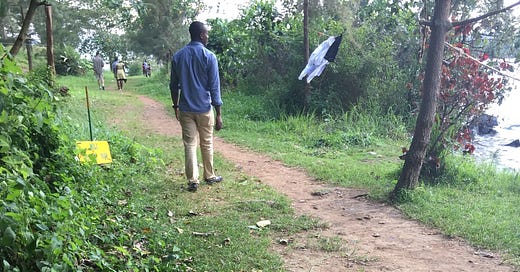Dear Friends,
As we continue to navigate the current pandemic, I figured it might be worth it to release this brief episode with my housemate, a former paramedic (although another author interview is coming soon!). At the end of this newsletter, I’ve also linked to a few stories that might pique your interest at this time.
Wishing you all good health, positive energy, patience and lots of support!
XOXO
Sonia Paul 00:10
Hello, everyone, welcome to Loitering, the occasional but lovable traveling mini pod I am currently testing in newsletter format. And today, I am loitering in the kitchen with a very special guest. Can you please introduce yourself?
Eli Weinburd 00:24
My name is Eli Weinburd. I was formerly a paramedic and currently work for Planned Parenthood.
Sonia 00:31
And he's also my roommate. So Eli, tell me a little bit about your background as a paramedic, especially as it relates to our current circumstances right now with COVID-19.
Eli 00:44
So my background is not super extensive, but I was a paramedic in Minnesota and then I was a paramedic in New Mexico. In terms of how it relates to where we are now — this came up because we heard a siren in the background. After deciding not to work as a paramedic, hearing the sound of sirens had a very significant connotation for me of relief that I was not on the ambulance needing to respond to whatever we were responding to. Now it feels like it's related to COVID. And I could be useful. And that's one of the reasons that I no longer work as a paramedic is because I did not feel useful taking people with chronic conditions to the emergency room.
Sonia 01:31
So, just to backtrack, this was the situation Eli was facing in that many of the people who are calling 911 to get an ambulance to go to the emergency room weren't having like, a sudden crisis. They were suffering from long term conditions that they just hadn't gone to their regular doctor to attend to — right?
Eli 01:50
Yeah. You can't do anything for someone who has been suffering with like, addiction or alcohol abuse for the last 20 years in a 15-minute ride to the hospital. And when you see them week after week, it is discouraging. With the demand and the call for the state, and even in my like, perusal of job websites, the explosion of job openings — the need feels different. And because it feels like there's a need, I feel more open to doing that work.
Sonia 02:24
What do you think about the situation of, you know, healthcare workers being on the front lines? And of course, you feel called to this profession even more so now, but it's also exposing yourself and — you know, we've talked about this, I live with you, the people around you to what you might also be exposed to, what's going on in your mind about that?
Eli 02:48
Yeah, I mean, there's a certain amount of, you know, being young and feeling invulnerable, which I won't deny.
Sonia 02:57
How old are you?
Eli 03:00
25. Thank you very much. But it seems to be an aspect of my own self-identity that if called upon, I would respond. And in this circumstance, we are called upon. And I've already fucked up. Because a few weeks ago, I was experiencing cold and flu-like symptoms, and I went to the grocery store, because I wanted to feel normal. I wanted to feel like I was healthy enough to get out of the house. And I shouldn't have. Now that I'm feeling healthy again, I could work on an ambulance.
Sonia 03:42
And this is just something that I also want to touch on while we're at it — the salary of a paramedic. So, can you talk a little bit about some of the salaries you've known in different situations and what the salary is here, and whether or not that's actually fair, given the kind of work paramedics are doing right now.
Eli 04:02
So, when I was in Minnesota working for the Mayo Clinic, world-renowned health care hospital, they paid me $20 an hour — $20 and 91 cents an hour. I think there are adjustments, obviously. for night shifts where you get a couple more dollars. And then working in Alamo on the Navajo reservation, they paid me $19 and 13 cents or something. There is a job posting with the San Francisco Fire Department that has a pay range between $47 and $61 per hour. The difference is staggering.
That said, like, I can't actually imagine how much it costs to have a family in San Francisco, which would not be my circumstance, obviously. But it definitely matters in terms of the cost of living and what you're getting paid. I've also been offered a paramedic job that paid like $13. And...I mean...it's hard to feel completely dismissive of something that other people don't have. Like, migrant workers who are bunking together and yet are getting paid less than $13, less than minimum wage, even possibly. Their risk is also high because they're getting crowded into — I'm getting sidetracked.
Sonia 05:38
It's ok. So the rates for being a paramedic are pretty shitty.
Eli 05:42
Yes, absolutely. They say EMT-P, EMT paramedic, stands for EMT paid, while EMT-B, EMT basic, stands for EMT broke.
Sonia Paul 05:53
Oh my gosh. Wow.
Eli 05:55
But, we're all broke. EMS, and specifically the profession of being a paramedic, has been attempting to professionalize itself for a number of years now. But, I think ultimately it's a fact where it's still essentially a blue-collar, working-class job, and emergency medical technician is an appropriate label. Because even if there's a push in the education of paramedics, to have them educated in a way that does not make them a technician, that is how they are being paid, and that's who ends up taking the job or sticking with it. And then the people who have the expertise and the knowledge and the commitment to raise that to a level beyond "technician," for lack of a better word, go on to medical school, or transfer into nursing, or do something that pays a living wage.
Sonia 06:54
So, the other day Governor Newsom, he called upon all medical professionals to rise to the cause. So, there is this website that already exists for healthcare workers to volunteer to be of service, to work in the case of an emergency. So, have you submitted your name up there? What's going on?
Eli 07:14
Yeah. So I filled out the information on the California Health Corps dot gov website. And now I guess I wait to hear back from them. From my understanding, it is a paid position and not a volunteer position, which is important, because at this point, we are still paying rent.
Sonia 07:35
Yeah, this is another thing we were talking about is just — I mean, of course, there is this moral conviction that a lot of people have to serve, especially right now. There's also economic reasons that people need to work. They need to pay what they have to pay including rent, utilities, family supplies.
What is the invisible aspect of being a paramedic that you think needs to be visibilized right now, even more so, where, paramedics, really, they're on the frontlines of addressing this pandemic right now?
Eli 08:14
A lot of paramedic response, from my experience, is responding to elder care facilities of one kind or another, whether it's nursing homes or assisted living facilities. From what I hear, those are largely on lockdown. I imagine they're still calling. A lot of what they called for were UTIs, urinary tract infections, in their elderly patients. And... I don't know, they're just a lot of variables in that situation and the interaction between emergency response, and what is intended at least to be non-emergent care for the vulnerable elder population in the U.S. Like, if we could take care of them where they're at, it would be great.
Sonia 09:03
Yeah. Well, so this has been a pretty heavy loitering conversation, to say the least. But of course, you know, we're coping. We're still here. Eli's laughing. We're trying to keep our spirits despite everything else that's happening. And, yeah. So, that's all we have for today of Loitering, the occasional but lovable traveling mini pod I am currently testing newsletter format. Thank you for listening and have a great day. Goodbye!
Some links:
One Worker’s Experience on the Morgue Overflow Shift, by Arun Venugopal
Our Pandemic Summer, by Ed Yong
The Rise of a Hindu Vigilante in the Age of WhatsApp and Modi, by Mohammad Ali
Millennials Don’t Stand a Chance, by Annie Lowery
The coronavirus has been great for Instacart. For its workers, it’s a different story., by Johana Bhuiyan
Planet Money has been doing some really great work if you’re wondering about $$.
It’s devastating that podcast producer Liyna Anwar passed away (shout out to UCLAradio.com News days), but if you’re in the mood to cook, read this 2012 blog series she and a friend did for Food52 about how to throw a backyard South Asian-inspired feast. More information about Liyna here and here.













Share this post